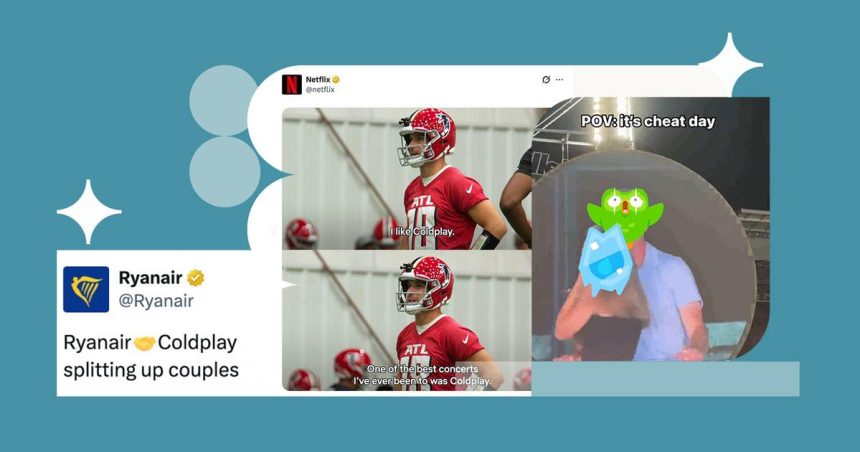It was the kiss cam seen ’round the world—and on just about every brand account.
When the former CEO and former head of HR at software company Astronomer were caught in an apparent moment of infidelity at a Coldplay concert in Massachusetts last week, it immediately set off a social media frenzy, with nearly 200,000 posts and more than 46 million engagements, according to intelligence platform Meltwater.
Brands were eager to get in on the action. The official accounts for Neon, Ryanair, NYC Sanitation, Duolingo, Chipotle, and Aldi posted the now-viral image of the couple with (sometimes stretched) references to their brand, while Netflix, Paramount Plus, Tesla, Ikea, StubHub, and the Seattle Mariners baseball team posted more subtle nods.
Beyond that, multiple sports teams and fans have re-created the moment on kiss cams at recent games.
At face value, it may have felt like a simple moment of collective humor—after all, adultery is pretty universally frowned upon. But in addition to putting brands at risk of backlash, experts tell us it could also put them at risk of potential legal action.
Too much, too far? Since brands began posting about the event, some people have spoken out against their involvement, citing the personal nature of the moment and its impact on both parties’ families.
“I think it’s fair game as an individual to clown on the main character of the day, but brands don’t need to participate in schadenfreude,” David McNamee, social media creative lead at social media agency Benchmob, wrote in a post on LinkedIn.
After all, participating in viral trends doesn’t necessarily lead to tangible results, Tom Miner, a social media strategist, noted in a post reviewing Google Trends results for Aldi after the brand posted its Coldplay take to suggest minimal, if any, impact.
In the past, brands that have chimed in on potentially fraught viral moments have faced backlash for involving themselves. In 2022, Duolingo found itself in hot water after weighing in on the much-talked-about Johnny Depp and Amber Heard domestic abuse trial from the brand’s account; the brand’s social media manager ended up issuing an apology.
Get marketing news you’ll actually want to read
Marketing Brew informs marketing pros of the latest on brand strategy, social media, and ad tech via our weekday newsletter, virtual events, marketing conferences, and digital guides.
Kelly Costello, head of corporate communications at Meltwater, cautioned that because new viral moments pop up regularly, brands should be strategic about the ones they choose to engage with.
“It takes years for brands to build trust and just seconds for them to lose trust by getting backlash over a post that’s deemed in bad taste,” she told us via email.
Chipotle has since deleted a post that seemed to reference the incident with a fake billboard that read, “It’s okay to cheat on your Chipotle order if it’s with Chipotle Honey Chicken.” Chipotle declined to comment.
Legally beyond? Beyond reputational risks, there are also legal risks to consider. Robert Freund, a business litigator and advisor focused on advertising compliance, told us that while it could seem like the kiss-cam moment was fair game because it happened publicly, posting a screengrab of the couple could potentially open brands up to legal action, including copyright infringement brought by the person who originally posted the video and the publicity rights on behalf of the people featured in the images.
“Any time a brand posts content, whether it’s with ad spend behind it or organically on social media, to promote whatever their brand is, and there’s a recognizable person in that content, and they have not obtained that person’s permission through a publicity rights release or something similar, they’re setting themselves up for exposure to a publicity rights claim,” Freund told us.
Depending on the caption associated with the post, Freund said there “could be a defamation angle.” Bigger brands with larger followings, he said, are often more likely to become a target for potential plaintiffs.
If brands simply must weigh in, he suggested a safer route, like what Netflix did by posting two stills of Atlanta Falcons quarterback Kirk Cousins from the streamer’s docuseries Quarterback saying that he loves Coldplay.
“Everyone probably gets the joke,” Freund said, “but I don’t think that that would present any risk.”
Read the full article here









